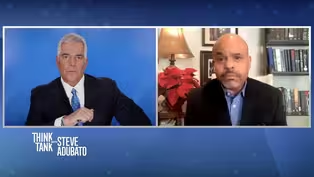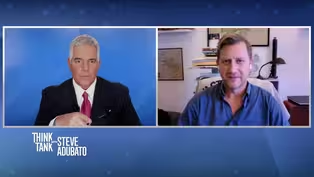
Outreach Efforts in the Philanthropic Community
Clip: 2/11/2023 | 8m 21sVideo has Closed Captions
Outreach Efforts in the Philanthropic Community
Otis Rolley, Head of Philanthropy and Community Impact at Wells Fargo, joins Steve Adubato to discuss economic improvement and their outreach efforts in the philanthropic community.
Problems playing video? | Closed Captioning Feedback
Problems playing video? | Closed Captioning Feedback
Think Tank with Steve Adubato is a local public television program presented by NJ PBS

Outreach Efforts in the Philanthropic Community
Clip: 2/11/2023 | 8m 21sVideo has Closed Captions
Otis Rolley, Head of Philanthropy and Community Impact at Wells Fargo, joins Steve Adubato to discuss economic improvement and their outreach efforts in the philanthropic community.
Problems playing video? | Closed Captioning Feedback
How to Watch Think Tank with Steve Adubato
Think Tank with Steve Adubato is available to stream on pbs.org and the free PBS App, available on iPhone, Apple TV, Android TV, Android smartphones, Amazon Fire TV, Amazon Fire Tablet, Roku, Samsung Smart TV, and Vizio.
Providing Support for PBS.org
Learn Moreabout PBS online sponsorship- We're now joined by Otis Rolley, Head of Philanthropy and Community Impact at Wells Fargo & CO. And President of the Wells Fargo Foundation.
Good to see you, Mr. Rolley.
- Really good to be here.
- Let me also disclose that Wells Fargo is a significant underwriter of our work at our not-for-profit production company.
Mr. Rolley talk about the work of the foundation and work of Wells Fargo particularly in not-for-profit organizations making a difference disproportionately in urban communities, please.
- Sure.
You know, we're just eager for our corporate foundation, one of the largest in the country to really help to address some systemic issues.
And so we target our investment, our philanthropic strategic investments and nonprofits that are focused in areas where we have expertise.
Small business and entrepreneurship, housing access and housing affordability and financial health.
- Yeah.
Some of those organizations include the African American Chamber of Commerce of New Jersey The Latina Entrepreneurship Training Series Program and New Jersey Community Capital Equitable Small Business Initiatives.
In these very challenging times, you know, three years into COVID, nonprofits, and we are one of them, not just fighting to stay relevant and alive but we're constantly raising money.
What have you seen in the not-for-profit community particularly in urban areas as it relates to their efforts to keep fundraising successful and allowing the organization to thrive?
- It has definitely been a challenging time particularly in light of the pandemic.
I think many nonprofits have had to really struggle not just in terms of fulfilling their mission in a difficult time but also being able to fund the mission.
So I think what we've seen the philanthropic community has really stepped up.
Fortunately, I think federal, state government, particularly during the pandemic, offered a lot of different grants and loans as well, because at the end of the day these small business, these nonprofits are small businesses.
- Absolutely.
- They employ tons of individuals.
They are dramatic and significant contributors to our overall health in terms of the economy.
And again, because we see small business and entrepreneurship as critical, not just to the health of New Jersey, but to the health of our nation, and it is a primary area of expertise for us, our foundation has tried to do a significant amount of outreach and support particularly during these trying times.
- Mr Rolley, you are from Jersey City originally.
- Born and raised.
- I'm a Newarker, born and raised.
I see a smile on your face as soon as I say Jersey City because?
- Well, because it was where I was raised it was where I was shaped.
It's one of the most diverse places actually in the United States.
I had the privilege of learning about culture and about the cornucopia that is humanity in Jersey City.
You know, the people who have invested in me, family, friends, etc.
It happened there.
And so I have a lot of love for my hometown and for my home state.
- I hear you.
You know, one of the organizations that you support, that Wells Fargo supports, that we're very aware of is a very important national initiative with local tentacles, if you will, and that's LISC.
The Local Initiative Support Corporation, LISC.
Why is LISC so important, particularly in urban communities?
- Well, you know, we are really careful in terms of who we choose to partner with because we understand as a foundation, there's a weird power dynamic there funder to fundee, right?
And so we try to make it very clear that no, it's a real partnership.
And LISC is one of those that really satisfied the due diligence not just in the state of New Jersey, but around the country.
They've been a real partner in community development and economic development, and that's because the local affiliates really have the ability to adjust and be flexible and meet the needs, the needs of the community that they serve.
And we just found them to be a phenomenal partner in the state of New Jersey.
They know the community, they have relationships there.
They understand how the only way that we're gonna be able to bridge that, that divide, that economic divide and and kind of reduce the racial wealth gap is by making key strategic investments in individuals and in communities.
And that aligns with the values of the Wells Fargo bank and the foundation.
- Mr. Rolley, where does, again, in these very challenging times, inflation is what it is, economic struggles that people face every day.
And even though the unemployment figures seem to be positive, those are statistics.
People's lives are much more complicated.
The reason I ask, that's the reason why I ask this question.
The place for employee volunteerism because people are saying very often it's like, well, you want me to volunteer?
I'm trying to keep my head above water trying to feed my family.
And now you're talking about volunteerism.
Talk about that.
It matters more than ever.
- It really does, because at the end of the day while our jobs provide us with the financial means to live, the living part of who we are is connecting to the other humans in our places of work, in our communities and our neighborhoods and we have long had a history of support for employee volunteerism.
We have over 250,000 employees, and we provide a couple of days off where we pay them to go and volunteer because we feel like it's an important connection.
It helps you to realize that the individuals who you are working for and with are truly your neighbors.
And so when you see the red shirts coming as we often when we volunteer, we're wearing our red jerseys or polo's, we see it as a critical part of our mission in being a real corporate citizen.
- You know, you talk about this from a corporate perspective but I'm curious about this before I let you go.
To what degree is the work you do highly personal for you?
- You know, I do see it as not just a job, but it's kinda a mission for me.
You know, I studied urban planning, urban studies with a concentration in housing and community economic development, and I've been blessed with the ability over the last 25 years of doing housing, community and economic development.
I'm really trying to bridge that divide and advance a sense of equity.
Some of the struggles that I had at Lincoln High School in, in Jersey City and seeing how a public school in Jersey City was not as supported in the way that some of our suburban neighbors were.
That struggle around the inequity has been deep and has really helped to inform a lot of the work that I do.
I'm so excited about the opportunity to advance an equity agenda at the Wells Fargo Foundation.
The bank values it, and that aligns with my personal values.
- Well said.
You've been listening to and watching Otis Rolley who's the Head of Philanthropy and Community Impact Wells Fargo & CO, and also President of the Wells Fargo Foundation.
Mr. Rolley, thank you so much for joining us.
Appreciate it.
- Thanks for the opportunity.
Have a good one.
- You too.
Stay with us.
We'll be right back.
- [Narrator] Think Tank with Steve Adubato has been a production of the Caucus Educational Corporation.
Funding has been provided by The Healthcare Foundation of New Jersey.
Newark Board of Education.
PSEG Foundation.
PSE&G, NJ Best, New Jersey'’s five-two-nine college savings plan.
The Adler Aphasia Center.
The North Ward Center.
Community FoodBank of New Jersey.
And by Johnson & Johnson.
Promotional support provided by Meadowlands Chamber.
And by NJBIZ.
How do you create change?
By cultivating hope.
And we see that every day, in the eyes of our preschoolers, in the souls of the seniors in our adult day program, in the minds of the students at Robert Treat Academy, a national blue ribbon school of excellence, in the passion of children in our youth leadership development program, in our commitment to connections at the Center for Autism, and in the heart of our community, the North Ward Center, creating opportunities for equity, education, and growth.
The Implications of Right-wing Extremism
Video has Closed Captions
Clip: 2/11/2023 | 10m 7s | The Implications of Right-wing Extremism (10m 7s)
The Story Behind "The Good Nurse" Charlie Cullen
Video has Closed Captions
Clip: 2/11/2023 | 10m 16s | The Story Behind "The Good Nurse" Charlie Cullen (10m 16s)
Providing Support for PBS.org
Learn Moreabout PBS online sponsorship
- News and Public Affairs

Top journalists deliver compelling original analysis of the hour's headlines.

- News and Public Affairs

FRONTLINE is investigative journalism that questions, explains and changes our world.












Support for PBS provided by:
Think Tank with Steve Adubato is a local public television program presented by NJ PBS

